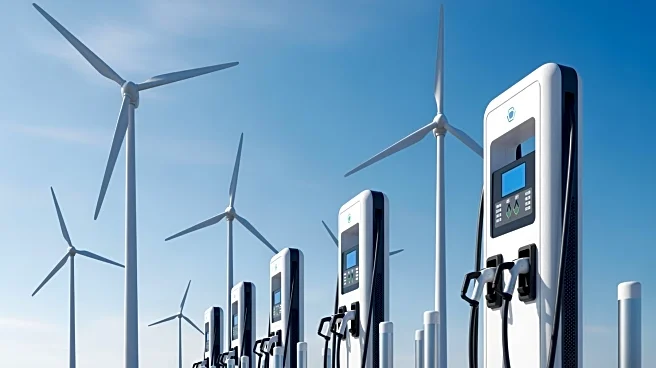What's Happening?
General Motors (GM) announced it is laying off 1,750 workers indefinitely and temporarily cutting 1,670 others as it scales back electric vehicle production. The Detroit-based automaker is realigning its
electric vehicle capacity at Factory Zero, its flagship electric vehicle assembly plant in Michigan, due to slower near-term electric vehicle adoption and an evolving regulatory environment. GM indicated it would incur a $1.6 billion loss for the third quarter of 2025 related to adjustments in its electric vehicle production and factories. Despite these changes, GM remains committed to its U.S. manufacturing footprint and believes its investments and dedication to flexible operations will make it more resilient and capable of leading through change.
Why It's Important?
The decision by GM to scale back its electric vehicle production highlights the challenges faced by automakers in transitioning to a sustainable future. The layoffs and production adjustments reflect the slower-than-expected adoption of electric vehicles, which could impact GM's long-term strategy and financial performance. The move may affect local economies in Michigan and Tennessee, where GM's facilities are located. Additionally, the decision underscores the broader industry trend of adjusting to changing consumer preferences and regulatory environments. As other automakers like Ford and Tesla also face similar challenges, the industry may need to reassess its approach to electric vehicle production and marketing.
What's Next?
GM plans to resume operations and cell production at its affected sites by mid-2026. During the temporary pause, Ultium Cells plans to make upgrades to both facilities to provide greater flexibility. GM will continue to evaluate and adapt production plans based on evolving market needs. Employees affected by the layoffs may be eligible to continue receiving a significant portion of their regular wages or salary, plus benefits. The company will also provide holiday pay to affected employees. As the industry navigates these changes, stakeholders will be closely monitoring GM's ability to adapt and lead in the evolving automotive landscape.
Beyond the Headlines
The layoffs at GM may have deeper implications for the automotive industry, particularly in terms of workforce dynamics and technological innovation. As GM adjusts its production plans, it may need to invest in retraining and reskilling its workforce to align with new technologies and production methods. The shift towards electric vehicles also raises questions about the sustainability and environmental impact of automotive manufacturing. GM's commitment to zero crashes, zero emissions, and zero congestion reflects a broader industry goal of reducing environmental impact while enhancing safety and efficiency. The company's ability to balance these goals with economic realities will be crucial in shaping the future of the automotive industry.









